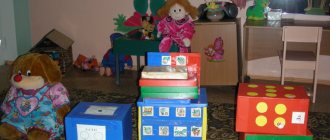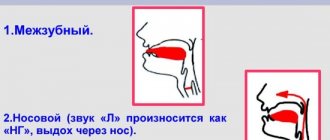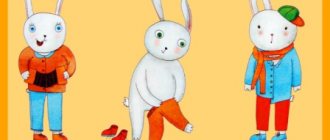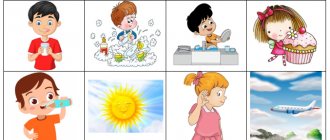LESSON SUMMARY FOR Speech Therapists
| 1 | | | | | | 1. Lesson on the formation of lexical and grammatical means of language in children of senior preschool age with ODD author: Rybakova Elena Vyacheslavovna, teacher-speech therapist MBDOU No. 66 “Rodnichok”, Prokopyevsk topic: Travel to the village to see grandmother Natasha correctional and educational goals:
- expand and deepen children’s understanding of pets;
correctional and developmental goals:
- develop coherent speech, auditory attention, phonemic perception, thinking, visual, figurative memory, fine motor skills;
- consolidate the formation of nouns with diminutive suffixes;
- develop dialogic speech, speech breathing, articulatory apparatus;
- improve the grammatical structure of speech, learn to form hyperbole words;
- develop the ability to answer questions clearly and competently;
correctional and educational goals:
- foster love and care for pets;
- develop cooperation skills: the ability to work in a team;
>>> read more
2. Lesson on the formation of lexical and grammatical means of language and the development of coherent speech in the preparatory group for children with special needs on the lexical topic “Transport” author: Olga Ivanovna Olkhovskaya, teacher-speech therapist of MBDOU No. 66 “Rodnichok”, Prokopyevsk topic: How to buy a car
correctional and educational goals:
- enrich and activate the vocabulary on the topic “Transport”;
- consolidate the ability to write descriptive stories about cars using a reference diagram;
- fix the names of the professions of people driving various types of transport, types of transport;
- activate adjectives in speech and consolidate the skill of agreeing adjectives with nouns;
- consolidate the ability to form plural nouns;
- learn to compose sentences with the complex conjunction “to”;
- consolidate the assimilation of the verb “to go” with various prefixes;
- consolidate the ability to clearly and correctly answer questions posed;
correctional and developmental goals:
- develop the ability to construct common sentences by introducing minor members of the sentence;
- develop skills in mastering the operations of generalization, classification, and syllabic analysis skills;
- develop gross and fine motor skills;
- stimulate the development of visual and auditory attention, memory, logical thinking;
correctional and educational goals:
- develop communication skills and respect for the driver’s work;
- cultivate a sensitive and attentive attitude towards each other;
>>> read more
3. Classes on sound pronunciation in the preparatory group author: Tatyana Viktorovna Shamova, teacher-speech therapist MBDOU Kindergarten “Teremok”, Bely Yar village, Republic of Khakassia topic: Introducing the sound and letter “u”
correctional and educational goals:
- teach children to clearly pronounce the sound “u”;
- highlight the sound “u” in a series of vowel sounds;
- determine the position of the sound “u” in words;
- introduce the letter “u”;
correctional and developmental goals:
- develop phonemic hearing;
- develop breathing;
- develop fine motor skills;
correctional and educational goals:
- develop cooperation skills;
>>> read more
4. Health-saving technologies in the speech correction system for preschool children (article with presentation) author: Elena Vladimirovna Schmidt, teacher-speech therapist MBDOU Kindergarten No. 105 “Antoshka”, Prokopyevsk Preserving the health of children in the process of upbringing and education is one of the priority tasks of pedagogy. The formation of a healthy lifestyle should begin in kindergarten. Preserving and promoting health, both in class and in free time, is especially important for children with speech impairments, since they are somatically weakened, and some have chronic diseases. >>> read more
5. Approximate long-term planning of work on the formation of lexical and grammatical categories and the development of coherent speech in children 5-7 years old (ONR-3 level) author: Loskutova Nadezhda Pavlovna, teacher-speech therapist MBDOU CRR - d/s No. 12 “Rodnichok”, city Krasnokamensk
Distribution of lexical topics (I year of study)
| Month | I week | II week | III week | IV week |
| September | Children's speech examination | Children's speech examination | Garden. Vegetables | Garden Fruits |
| October | Autumn. Mushrooms and berries | Autumn. Trees | Toys | Kindergarten |
| November | Wild animals | How the forest prepares for winter | Migratory birds | Wintering birds |
| December | Pets | Domestic animals and birds, their young | Winter. Winter clothes | Winter fun. New Year |
| January | Holidays | Human. Body parts | Transport | Transport. Traffic Laws |
| February | Dishes. Food | Materials and tools | Defenders of the Fatherland | Houseplants |
| March | Mom's holiday. Family | Early signs of spring. First flowers | My house. City | Spring in nature |
| April | People's labor in spring | Space | Return of the birds. Insects | Furniture |
| May | Victory Day | Trees and shrubs | Flowers | Seasons |
Distribution of lexical topics (II year of study)
| Month | I week | II week | III week | IV week |
| September | Children's speech examination | Children's speech examination | Deciduous trees. Mushrooms | Autumn fair. Garden Garden |
| October | Signs of autumn. Autumn months | Autumn clothes, shoes, hats | Where did the bread come from? | House. Furniture |
| November | Migratory and waterfowl | Pets and their babies | Wild animals and their young. Preparing for winter | Autumn (summary) |
| December | Winter. Winter months. Winter fun | Wintering birds | Our town | New Year. Coniferous trees |
| January | Holidays | Transport. Professions in transport | Professions. Labor actions | Tools. Electrical appliances |
| February | Dishes. Food | Water in nature | Defenders of the Fatherland Day. Military professions | Winter (summary) |
| March | Early spring. Spring months. First flowers | March 8. Women's professions | Zoo | In the poultry yard |
| April | Medicinal plants | Cosmonautics Day | Fauna of the seas and oceans. River and aquarium fish | School. School supplies |
| May | My Fatherland. Russia | Meadow, field, forest | Insects | Summer. Summer months |
>>> read more
6. Graphic materials “Learning tongue twisters” and “Why articulation gymnastics is needed” author: Loskutova Nadezhda Pavlovna, teacher-speech therapist MBDOU CRR - kindergarten No. 12 “Rodnichok”, Krasnokamensk >>> see more
7. Differentiation of sounds [d] - [t] in syllables, words, sentences. author: Terentyeva Natalya Aleksandrovna, teacher-speech therapist MBOU secondary school No. 3 Yamalo-Nenets Autonomous Okrug, Salekhard goal:
- clarification and comparison of articulation and sound of sounds [d] and [t];
tasks:
- teach children to differentiate sounds;
- enrich children's vocabulary;
- develop skills of syllabic analysis and synthesis;
- consolidate knowledge of language norms;
- promote the development of coherent speech, higher mental processes (development of voluntary attention, auditory memory, motor skills);
- learn to establish cause-and-effect relationships;
>>> read more
8. Compiling descriptive stories about domestic animals using a visual and graphic plan. author: Bondarenko Svetlana Viktorovna, teacher-speech therapist, MDOU No. 4 “Fairy Tale”, Zaozersk, Murmansk region goals:
- expansion and activation of the subject vocabulary;
- expansion and activation of the dictionary of signs on the topic “Pets”;
- development of thinking - riddles;
- strengthening the skills of practical formation of nouns with diminutive suffixes;
- practical use of possessive adjectives;
- the use of nouns in the prepositional case;
- formation of coherent speech;
- learning the ability to compose descriptive stories using a visual and graphic plan;
- development of visual perception, attention, memory, speech attention;
>>> read more
9. Compiling a story about winter using a visual didactic aid using a flannelgraph. author: Svetlana Viktorovna Bondarenko, teacher-speech therapist, MDOU No. 4 “Fairy Tale”, Zaozersk, Murmansk region topic: How children helped the Snowman goals:
- activation of subject vocabulary on the topic;
- development of thinking - riddles;
- establishing cause-and-effect relationships;
- development of logical thinking;
- development of voluntary attention, memory, fine motor skills of the hands, visual perception, speech perception;
- development of coherent speech, continuing to teach children the ability to write a story using a flannelograph;
>>> read more
10. Lesson on the development of phonemic hearing for children in the preparatory speech therapy group. author: Bondarenko Svetlana Viktorovna, teacher-speech therapist of MDOU No. 4 “Fairy Tale”, Zaozersk, Murmansk region topic: Sound [s]. Letter "c" of purpose:
- consolidate the skills of clearly distinguishing and pronouncing the sound [s] in syllables, words, phrases;
- highlight the sound [s] at the beginning, middle, end of a word;
- dividing words into syllables;
- sound analysis of words;
- counting sentences in a text;
- drawing up a proposal outline;
- drawing up proposals based on subject pictures;
- exercise in the formation of diminutive nouns;
- acquaintance with the letter “s”;
- development of phonemic hearing, memory, attention, thinking, coherent speech;
>>> read more
11. Lesson on teaching literacy for a preparatory speech therapy group. author: Svetlana Viktorovna Bondarenko, teacher-speech therapist, MDOU No. 4 “Fairy Tale”, Zaozersk, Murmansk region topic: Going to school soon goals:
- strengthen children’s ability to isolate sentences from text;
- practice writing sentences;
- learn to divide words into syllables and indicate their sequence;
- learn to differentiate sounds [l] - [r];
- learn to distinguish consonant sounds by hardness and softness;
- improve the ability to identify sounds [l] and [r] at the beginning, middle, and end of a word;
- improve the skill of sound analysis of words;
- promote the development of speech, thinking, visual and auditory attention, memory;
>>> read more
12. Lesson for children of the senior speech therapy group on the lexical topic “Dishes”. author: Bondarenko Svetlana Viktorovna, teacher-speech therapist, MDOU No. 4 “Fairy Tale”, Zaozersk, Murmansk region topic: Utensils purposes:
- activation of the subject dictionary on the topic “Cookware”;
- developing the skill of forming relative adjectives;
- teaching children to correctly coordinate nouns with numerals in speech;
- exercise in the formation of nouns with a diminutive meaning;
- development of memory, attention, thinking;
>>> read more
13. Lesson on the formation of the lexical and grammatical structure of speech. author: Fefilova Ekaterina Valerievna, teacher-speech therapist MBDOU No. 101, Arkhangelsk topic: How we taught Confusion goals:
- consolidate the skill of practical use of the studied prepositions in speech;
tasks:
- activate children's vocabulary on the lexical topic “Clothing”;
- consolidate the ability to compose sentences with the conjunction “a”;
- correct thinking through exercises in comparison and generalization;
- correct visual attention and long-term memory through recollection exercises;
- cultivate the ability to listen and tactfully correct a friend;
>>> read more
14. Summary of direct educational activities in the preparatory group. author: Osipova Elena Petrovna, speech therapist teacher, GBDOU Kindergarten No. 49, Primorsky district, St. Petersburg topic: In a forest clearing direction:
- cognitive and speech development;
- social and personal development;
leading educational field:
- communication;
tasks in the field of “communication”:
- continue the development of phonemic hearing;
- continue to develop auditory and visual memory and attention;
- improve the ability to use prepositions “on”, “above”, “under”, “by”;
- continue the development of sound-letter analysis and synthesis;
- continue to train children in reading whole words;
- improve the development of coherent speech by activating the creative abilities of children (telling a story on behalf of a character - “entering the picture”) and going beyond the visual data, according to the imagination (what happened before?);
- continue to develop the skill of free and calm communication with adults and children;
tasks in the field of “cognition”:
- consolidation of knowledge of geometric shapes;
- continue the development of spatial orientation and orientation on a sheet of paper;
- strengthen children's knowledge about wild animals living in our forests;
- cultivate interest in GCD through the use of entertaining exercises;
tasks in the field of “socialization”:
- improve the ability to listen and hear the teacher;
- cultivate friendly relationships between children, respectful attitude towards others;
- continue to form the habit of listening to your interlocutor and not interrupting him;
>>> read more
15. Summary of direct educational activities in the senior group. author: Vasilyeva Marina Aleksandrovna, teacher of the speech group of the GBDOU Kindergarten No. 72 of the Krasnogvardeisky district of St. Petersburg topic: A walk in the autumn forest direction:
- cognitive and speech development;
- social and personal development;
leading educational field:
- communication;
tasks in the field of “communication”:
- development of auditory and visual memory and attention, development of tactile memory;
- develop spatial concepts, the ability to reflect in speech using the prepositions “on”, “above”, “under”, “in” the location of objects;
- develop coherent speech, develop the ability to answer questions clearly and competently;
- develop the skill of free and calm communication with adults and children;
tasks in the field of “cognition”:
- expand children's knowledge about wild animals living in our forests;
tasks in the field of “socialization”:
- improve the ability to listen and hear the teacher;
- cultivate friendly relationships between children, respectful attitude towards others;
>>> read more | 1 | | | | | |
Summary of GCD on speech therapy for the senior group
Speech therapy session in the senior group
Abstract of the GCD in speech therapy “At Cinderella’s ball”
Author:
Elena Viktorovna Rakutina.
Teacher - speech therapist MBDOU "Komsomolsky kindergarten" Kungur district Perm region Description:
Notes on speech therapy for the senior group of kindergarten on differentiating the sound "L - L".
Children reinforce the pronunciation of given sounds in a playful way. Goal:
strengthening the skills of distinguishing the sounds L-L in coherent speech.
Objectives:
continue to teach how to differentiate sounds by hardness and softness, sound analysis, drawing up sentences using diagrams; form the plural of nouns, coordinate nouns with numerals; develop phonemic awareness, coherent speech, imagination, thinking, attention, memory, general and fine motor skills; develop facial muscles. strengthen the ability to work in pairs
Progress:
1. Organizational moment - Hello, guys. - Do you love to travel? — What type of transport can you use? — Yes, you can travel by transport, or you can mentally go on a trip. Guess the riddle: She ran away from the prince so quickly that she even lost her shoe. (children's answers) - I propose to go on a journey through the fairy tale “Cinderella”, written by Charles Perrault. —Who are the main characters of this fairy tale? (children's answers). Psycho-gymnastics. - Place mirrors and depict on your faces the good Fairy, the evil stepmother, the sad Cinderella, the surprised face of the prince. 2. Subject message. -Together with “Cinderella” we will repeat the correct pronunciation of the sounds l – l. 3. Sound characteristics. -Take some air into your tummy and pronounce the sound l. What sound is this? (Consonant, hard, sonorous). The sound is soft. 4. Pronunciation of sounds l - l in syllables and words. -What was Cinderella like? (Affectionate, sweet, kind). -What kind of work did she do? Tell me the right words. Cinderella floors... (washed, swept, wiped, scraped), stove... (heated), dinner... (cooked, cooked), linen... (washed, rinsed, ironed), beds... (digged, weeded), dishes... (soaped, cleaned). - How are these words similar? What syllable do they end on? (The syllable la). — At the balls, people not only dance, but also sing. Game "Conductor". Boys pronounce the syllable LA, and girls pronounce the syllable LA. I will lead our choir. (To the tune of the song “A Christmas tree was born in the forest”) - Why was the girl called “Cinderella”? - What is ash? —What was Cinderella’s dress dirty with? -What did she dream about? - How can we help her? — Do her work for her and make her dreams come true. 5. Development of fine motor skills of the hand. — We work in pairs: girls collect beans, boys collect onions. — What is the last sound in the word “bean”? Divide this word into syllables. How many syllables? - Where is the L sound in the word? (Beginning, middle, end). How many syllables? -Which of these words is longer? Formation of adjectives. — What will Cinderella wear to the ball? — What can you make a dress from? (Fabric samples) - If we take silk, what kind of dress will it be? (Silk). From satin - satin, from linen - linen. 6. Development of language analysis and synthesis. — The fairy wanted to give beads, but they fell apart. Help me collect. What is the first sound in the word BAL? What color do we use? That's right blue. The second sound in this word? What color? That's right, the vowel is in red. The last sound is a consonant, in blue. 7. Pronunciation of sounds in sentences. -Where did the Fairy send Cinderella? (The fairy sent Cinderella to the garden) - Look at the screen and name what is depicted in one word. (Vegetables) - What vegetable do we need, describe it without naming it. Scheme (shape, size, color, what is the use). What can Cinderella make from pumpkin? (Pumpkin porridge, pumpkin soup, pumpkin jam) Formation of the plural of nouns. “One is many” - Look at the screen and tell what items Cinderella needs to get to the ball (horse - horses, dress - dresses, shoes - shoes, scarf - scarves, mouse - mice, lizard - lizards). Agreement of nouns with numerals. -Look at the diagram and make a sentence based on it. (Cinderella has 1 (3, 5) dress. Cinderella has 1 (3,5) ribbon). -The pumpkin was turned into a carriage, the mice into horses, the lizards into servants. The dress turned into a golden, beautiful outfit. Cinderella is ready to go to her first ball. 8. Analysis of the verbal composition of the sentence. — Cinderella went to the ball. Make a diagram of this sentence from word strips. - What word can replace the word went? (Left, rushed, got there) - What road did Cinderella travel along? (Straight, winding, wavy) - Draw a winding path in the sand with both hands. 9. Physical exercise. — Cinderella was at the ball. What was she doing there? (I met, danced, moved in, laughed, danced) - Now Cinderella and I will dance a waltz. Boys, invite girls. Clarification of the semantic meaning of the word “midnight”. — Cinderella didn’t notice the time, but suddenly the clock struck midnight. - How do you understand this word? 10. Development of coherent speech. - Tell me what happened next. — How did you find Cinderella? - How did the fairy tale end? 11. Summary of the lesson. - How did we help Cinderella? — What was interesting to you, what difficulties did you experience? - Thank you for your work.
We recommend watching:
Game - quiz on traffic rules in the senior group "Young Pedestrian" Summary of a game lesson in the senior group on speech development Summary of an individual lesson on differentiating sounds etc. for children of the senior group Correctional - developmental educational activity with a subgroup of children 5-6. Abstract
Similar articles:
Musical lesson using logorhythmics in the senior group of a preschool educational institution
Summary of an integrated lesson on the topic “Animals” in the senior group
Lesson summary - travel for children of the senior group of preschool educational institutions on the topic: Birds
Summary of an integrated lesson on the topic “Space”. Senior group
Summary of educational activities in the senior speech therapy group on the topic “Construction”




